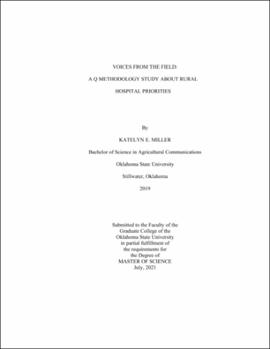| dc.contributor.advisor | Riggs, Angel | |
| dc.contributor.author | Miller, Katelyn E. | |
| dc.date.accessioned | 2022-01-21T19:33:52Z | |
| dc.date.available | 2022-01-21T19:33:52Z | |
| dc.date.issued | 2021-07 | |
| dc.identifier.uri | https://hdl.handle.net/11244/333822 | |
| dc.description.abstract | In the face of rampant and widespread rural hospital closures in Oklahoma(Woodring et al., 2021), voices of rural residents are being left out of decision-making conversations (DeKeseredy et al., 2013). This comes at a high cost for rural people, both financial and in the lives and wellbeing of those seeking care in these areas (Miller et al., 2020). Researchers used a conceptual framework based on Phillips and Pittman's (2014) rural development text, focusing on the thoughts about economy, social impact, politics, and technical assets. | |
| dc.description.abstract | Seeking to understand priorities of rural Oklahomans regarding rural healthcare, researchers employed Q Methodology, a form of factor analysis designed to describe subjective perspectives in a small group of participants (Brown, 1980). Twenty rural Oklahomans participated by sorting a 43-statement Q set of opinions on the rural healthcare phenomenon according to their thoughts on the condition of instruction, "What matters to you about having a hospital in your community?" | |
| dc.description.abstract | Based on the interpretation of Q sort data, interviews, and field notes, this study describes two priority mindsets, the Business Priority perspective and the Relationship Priority perspective. The Business Priority perspective has a thrive mentality, observation through economic impact, and is full of determination when facing hurdles. The Relationship Priority perspective has a survive mentality, sees their world through an idyllic view, and values unity above other factors. | |
| dc.description.abstract | Though these perspectives have different initial priorities regarding healthcare, they have a common, foundational priority of preserving life and making decisions that will further that end. Based on these two perspectives, legislators, local stakeholders, and rural hospital operators should accept and involve engaged rural residents in the conversations about rural healthcare to best serve the people living in critical Oklahoma communities. | |
| dc.format | application/pdf | |
| dc.language | en_US | |
| dc.rights | Copyright is held by the author who has granted the Oklahoma State University Library the non-exclusive right to share this material in its institutional repository. Contact Digital Library Services at lib-dls@okstate.edu or 405-744-9161 for the permission policy on the use, reproduction or distribution of this material. | |
| dc.title | Voices from the field: A Q Methodology study about rural hospital priorities | |
| dc.contributor.committeeMember | Blackwell, Samantha | |
| dc.contributor.committeeMember | Woodring, Mark | |
| osu.filename | Miller_okstate_0664M_17349.pdf | |
| osu.accesstype | Open Access | |
| dc.type.genre | Thesis | |
| dc.type.material | Text | |
| dc.subject.keywords | agricultural communications | |
| dc.subject.keywords | healthcare | |
| dc.subject.keywords | q methodology | |
| dc.subject.keywords | rural development | |
| dc.subject.keywords | rural health | |
| thesis.degree.discipline | Agricultural Communications | |
| thesis.degree.grantor | Oklahoma State University | |
